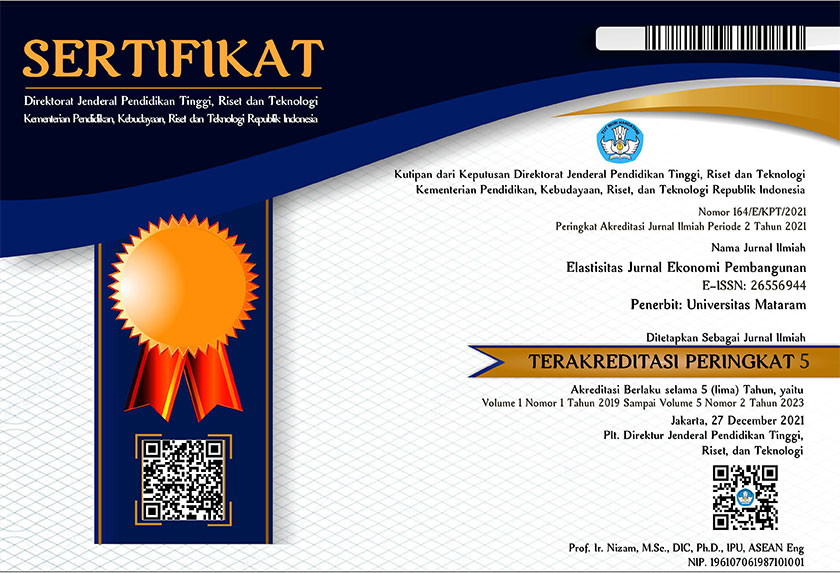DESAIN KEBIJAKAN PEMBAYARAN JASA LINGKUNGAN SEBAGAI ALTERNATIF UNTUK PEMBANGUNAN PARIWISATA BERKELANJUTAN DI PULAU KECIL : STUDI KASUS DI KABUPATEN LOMBOK UTARA
DOI:
https://doi.org/10.29303/e-jep.v6i2Keywords:
Payment for Ecosystem Services, Sustainable Tourism, Environmental PolicyAbstract
The tourism industries on small islands frequently prioritize economic gains, while the environmental consequences of these activities, which include the impact on the ecosystem, are typically overlooked due to insufficient consideration of conservation costs. If this pattern persists, the marine parks in the region may eventually lose their appeal and adversely affect the tourism industry. The Payment for Ecosystem Services (PES) program offers a potential avenue for executing conservation fundraising initiatives by leveraging contributions from travelers and tourism enterprises. This study employs a qualitative methodology to analyze public policies pertaining to the implementation of the PES program in Gili Matra. The study concluded that it is feasible to establish PES (Payment for Ecosystem Services) programs on Gili Matra through mandatory initiatives, with the aim of fostering a sustainable tourism sector.
References
Allendorf, T. D., & Yang, J. (2013). The role of ecosystem services in park–people relationships: The case of Gaoligongshan Nature Reserve in southwest China. Biological Conservation, 167(0), 187-193. doi:http://dx.doi.org/10.1016/j.biocon.2013.08.013
Aryal, K., Bhatta, L. D., Thapa, P. S., Ranabhat, S., Neupane, N., Joshi, J., ... & Shrestha, A. B. (2019). Payment for ecosystem services: Could it be sustainable financing mechanism for watershed services in Nepal. Green Finance, 1(3), 221-236.
Bellver-Domingo, Á., & Hernández-Sancho, F. (2022). Circular economy and payment for ecosystem services: A framework proposal based on water reuse. Journal of Environmental Management, 305, 114416.
Bremer, L. L., Farley, K. A., Lopez-Carr, D., & Romero, J. (2014). Conservation and livelihood outcomes of payment for ecosystem services in the Ecuadorian Andes: What is the potential for ‘win–win’? Ecosystem Services, 8(0), 148-165. doi:http://dx.doi.org/10.1016/j.ecoser.2014.03.007
Coase, R. H. (1960). The Problem of Social Cost. Journal of Law and Economics, 3, 1-44.
Costanza, R., Paruelo, J., Raskin, R. G., Sutton, P., Van Den Belt, M., D'Arge, R., . . . O'Neill, R. V. (1997). The value of the world's ecosystem services and natural capital. Nature, 387(6630), 253-260. doi:10.1038/387253a0
Diswandi, D. (2017). A hybrid Coasean and Pigouvian approach to Payment for Ecosystem Services Program in West Lombok: Does it contribute to poverty alleviation? Ecosystem Services, 23, 138-145. https://doi.org/10.1016/j.ecoser.2016.12.005
Diswandi, D., Afifi, M., Fadliyanti, L., & Hailuddin, H. (2021, May). Tourism enterprises’ willingness to contribute to payment for ecosystem services (PES) program in Gili Matra, Indonesia. In 2nd Annual Conference on Education and Social Science (ACCESS 2020) (pp. 418-421). Atlantis Press.
Pigou, A. C. (1932). The economics of welfare. London: Palgrave Macmillan.
Schuhmann, P. W., Casey, J. F., Horrocks, J. A., & Oxenford, H. A. (2013). Recreational SCUBA divers' willingness to pay for marine biodiversity in Barbados. Journal of environmental management, 121(0), 29-36. doi:http://dx.doi.org/10.1016/j.jenvman.2013.02.019
Wunder, S. (2005). Payment For Environmental Services : some nuts and bolts. CIFOR Occasional Paper No. 42.
Wunder, S. (2007). The Efficiency of Payments for Environmental Services in Tropical Conservation. CONSERVATION BIOLOGY, 21(1), 48-58. doi:10.1111/j.1523-1739.2006.00559.x






